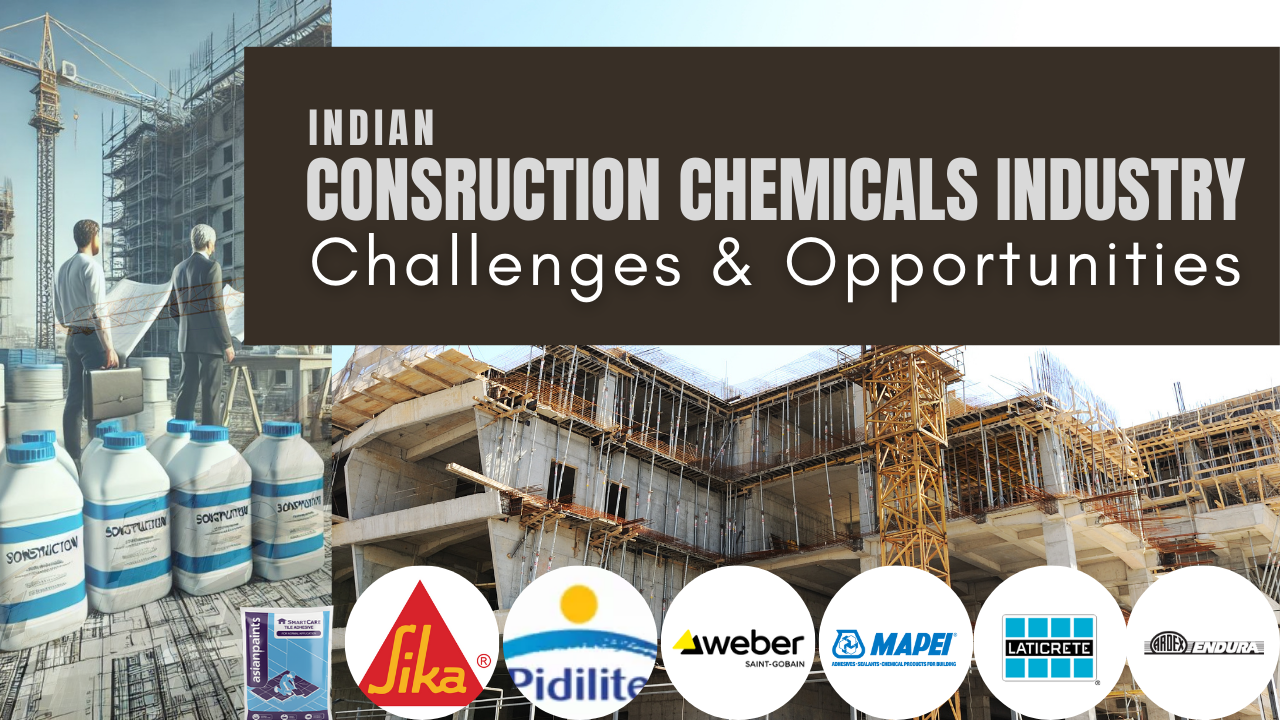The construction chemicals industry encompasses a wide range of specialized chemical products that are used in the construction sector to improve the performance, durability, and longevity of structures.
Growing awareness of sophisticated building materials and continuing infrastructure initiatives are driving the market’s expansion. With an impressive growth between 7-8%, India stands tall in the sector with lucrative business for the industry.
Although the industry’s future is bright generally, businesses in this field—particularly those focusing on B2B sales—face certain challenges.
“The construction chemical industry in India faces significant challenges, particularly in the B2B segment. Intense competition, complex sales cycles, and a lack of awareness about the benefits of advanced chemicals make it difficult for companies to differentiate themselves. Additionally, the price sensitivity of customers and logistical challenges in building a robust distribution network further complicate the market landscape,” says Dinesh Vyas, cofounder OTF.
Key Categories in Construction Chemicals
The construction chemicals sector includes a broad spectrum of specialty chemical compounds used in the building industry to increase the lifespan, performance, and durability of structures. From improving the qualities of concrete to shielding structures from water damage, these chemicals add value to many facets of construction.
The following are the main areas that the building chemical business covers:
- Concrete Admixtures: These additives, such as superplasticizers, retarders, and accelerators, enhance concrete’s workability, strength, and durability. They are crucial in various construction projects, including buildings, bridges, and roads.
- Waterproofing Chemicals: Products like bituminous membranes, polyurethane coatings, and acrylic emulsions are designed to shield structures from water damage, making them vital for basements, roofs, and other moisture-prone areas.
- Flooring Compounds: Materials such as epoxy coatings, polyurethane floorings, and self-levelling compounds are used to create robust and aesthetically pleasing floors in residential, commercial, and industrial settings.
- Repair and Rehabilitation Chemicals: These include repair mortars, epoxy resins, and corrosion inhibitors, used to restore and extend the life of structures like buildings, bridges, and other infrastructure.
- Sealants and Adhesives: Silicone sealants, polyurethane adhesives, and epoxy adhesives bond construction materials and seal gaps to prevent leaks, commonly used in windows, facades, and roofing.
- Protective Coatings: Coatings like anti-corrosion paints and UV-protective layers are applied to surfaces to protect against environmental factors. These are essential for industrial plants, bridges, and marine structures.
- Grouts and Anchors: Products such as cementitious grouts and anchoring adhesives fill gaps and secure elements within structures, ensuring stability and strength in applications like tile installation and machinery anchoring.
- Tile and Stone installation chemicals: This is one of the fastest-growing categories in India. Popularity of large size porcelain tiles and the failure of conventional cement mortar in such installations, coupled with increasing awareness is contributing to the huge growth.
You may like: Empowering Future Designers: Integrating Flooring Material Education in Curricula
Key Challenges in the Construction Chemical Market
While every Industry and business has its share of challenges and concerns, when it comes to B2B segment, we observed the following common and major challenges that professionals working in different companies are tackling.
1. Fierce Competition, product differentiation
The construction chemical industry in India is highly competitive, with numerous players offering similar products. The situation makes it difficult for company sales personnel to differentiate themselves and gain a competitive edge.
2. Complex Sales Cycle
The B2B decision-making process is lengthy and complex. The sales process in the construction chemicals sector involves multiple stakeholders, including architects, contractors, builders, and project managers.
3. “Do we really need it?”
Lack of awareness and education about advanced chemicals is a big issue. Many potential customers in the B2B segment may not fully understand the benefits of using specialized construction chemicals, leading to resistance to adopting new and advanced products.
4. “You are costly!”
Customers, particularly in the Indian construction industry, are highly price sensitive. It is not uncommon to see B2B clients often prioritizing cost over quality. A significant challenge for companies trying to sell premium products.
Read this Article also: Paints: Colour Dilemma to Quality Concerns, While Choosing Paints!
5. Distribution Network Challenges
Given India’s large size and diverse regional market characteristics, creating a strong distribution network might be difficult. Logistical challenges for inventory management and multi-brand association of dealers also puts pressure on cost and efforts.
Overcoming the Challenges in Construction Chemical Industry
We are witnessing how seriously construction chemical companies are making efforts to gain and retain market share in the promising industry apart from developing better products. The marketing efforts for B2B segment include – strategic associations with key stakeholders in the construction industry and proactive participation in Industry related events and exhibitions.
Incentive and loyalty programmes seem to be a common exercise in building material industry and now in construction chemicals too. Implementation of CRM and going for targeted digital marketing are the two other important aspects of marketing efforts that we see helping the companies.
You May like to know this: Sustainability and Health: Growing Awareness about Certifications
When we spoke to Dinesh Vyas for his views on the above-mentioned challenges, he agreed to our observation but emphasised on following four points that according to him, hold key to successful marketing in this segment.
1. Articulate Value Proposition as Differentiation
It is not enough to design good brochures. Every salesman should focus on creating compelling narratives that highlight the distinct advantages of their offerings. The brand must emphasize the long-term benefits of their products, such as durability, environmental friendliness, and cost-effectiveness over time.
2. Educational Content and Marketing
Producing educational content that addresses common challenges and misconceptions in the industry can help build trust with potential clients. Focus on creating well-researched articles, insightful case studies, and informative videos that demonstrate the importance of using construction chemicals. Providing expert advice and collaborating with influencers and platforms that resonate with target audience will further enhance the reach and credibility.
3. Sustainability and Innovation
B2B clients that are becoming more aware of their environmental impact may be effectively reached by marketing innovative technology and internal sustainable practices as part of a larger commitment to sustainability.
4. Regional Market Focus
Adopting region-specific marketing strategies tailored to the diverse needs of the Indian market could be rewarding. Adjusting marketing efforts to meet the unique preferences of customers in different regions, investing in local distributors and sales teams can further help in gaining long term market share.
If you found this article insightful, we invite you to subscribe to our blog for more expert insights and updates on the construction chemical industry. Stay informed about the latest trends, strategies, and innovations by joining our community today!


